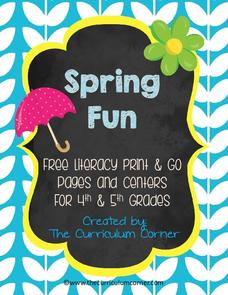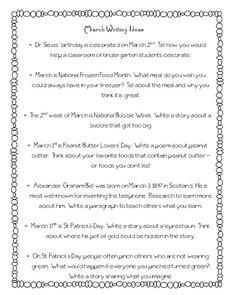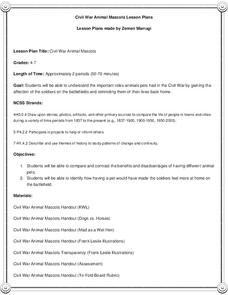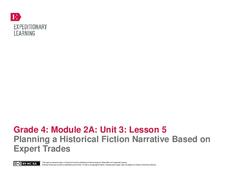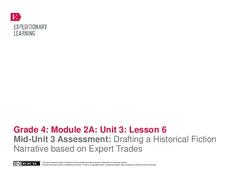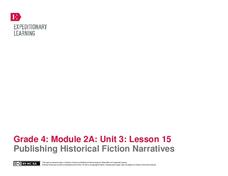Have Fun Teaching
March Writing
How do you catch a leprechaun? Let your writers decide with a resource that has them thinking about story elements and writing creatively. Learners plan their writing in two graphic organizers—one with setting, characters, problem, and...
Curriculum Corner
Spring Fun Literacy Centers
Looking for spring-themed literacy centers? Look no further because here is a resource packed full of literacy skills practice, including spring verbs, ABC order, spring synonym match, spring phrases, abbreviation match, and a sentence...
SEN Teacher
Literacy Dice
Reinforce literacy skills using a six-sided die that focuses on phonics and story starters. Scholars roll, and show what they know about blends, plots, and more!
DLTK
St. Patrick's Day Creative Writing Prompt #3
On March 17th, celebrate St. Patrick's Day with a cheery writing prompt that challenges scholars to finish a prompt detailing what they saw when they woke up on the morning of St. Patrick's Day.
DLTK
St. Patrick's Day Creative Writing Prompt #2
Make narrative writing festive with a St. Patrick's Day-themed writing prompt! Sscholars provide a detailed account of Sean the Leprechaun and an amazing event that happened to him on a joyful spring morning.
Curriculum Corner
March Writing Ideas
So many things are happening in March, why not write about them? From Dr. Seuss' birthday to Peanut Butter Lover's Day to St. Patrick's Day, the prompts listed in the worksheet are sure to spark creative writing.
Walt Disney Company
Elizabeth Started All the Trouble
Elizabeth Cady Stanton was a famous suffragette that paved the way for equal rights for women. Readers respond to before, during, and after reading questions based on her story. The resource is a great addition to a lesson during...
Curriculum Corner
Comic Strip Writing Templates
Spark interest in young writers with a three-box comic strip template including speech bubbles. Learners draw and write a sequential comic with boxes that are stacked on top of each other. Using this format or the other templates...
Curated OER
Book Report Task Cards
With 52 task cards, learners will not run out of things to do with a book they are reading independently or with the class. Tasks include making a poster on a specific topic, writing a summary, drafting a sequel, creating a windsock,...
Michigan State University
Create an Animal
Think beyond the animals and habitats we've already discovered and allow scholars to dream up their very own habitat and an animal that lives there. Class members present the new habitat and animal on a poster alongside an...
Music Publishers Association of the United States
I Made It. I Own It. Please Don't Steal It.
Explore the world of copyright law with a variety of activities to instill the importance of respecting creative property. Scholars watch an animated tale then take part in a grand conversation detailing the video's main idea, details,...
Museum of Tolerance
Family Role Model Activity
What does is take to be a role model? Through grand conversation, and the use of books and a graphic organizer, scholars find out and apply the requirements to identify a role model within their family. They then journey through the...
Civil War Trust
Civil War Animal Mascots
A pet can offer comfort, friendship, and loyalty in the most stressful of situations. Here is a lesson plan that explores the important role animals played during the Civil War. Class members read informative texts, complete a...
Civil War Trust
The Common Civil War Soldier
Imagine you are a soldier in the Civil War. What are you wearing? What do you need to carry with you? Examine the life of a person during the Civil War, from drummer boys to powder monkeys to musket-toting soldiers. Elementary...
Fisher Reyna Education
Personal Narrative Writing Prompts
Looking for stimulating writing prompts that won't make young writers cringe? A set of five personal narrative writing prompts engages pupils in analyzing, thinking, connecting, and writing about particular topics. Each...
EngageNY
Preparing to Write Historical Fiction: Determining Characteristics of the Genre
A language arts instructional activity helps young writers identify elements that make up historical fiction. First, it guides them through elements of fictional pieces with vocabulary cards. Then, pupils work collaboratively to...
EngageNY
Planning Ideas: Developing a Colonial Character Profile
The second lesson in a historical fiction series encourages pupils to develop a character profile of a colonial person using research acquired in the previous unit. Learners prepare their historical fiction narrative by responding to a...
EngageNY
Practice Planning a Historical Narrative: The Wheelwright
Fourth graders use a four-square graphic organizer to plan a paragraph writing about a wheelwright. Using gathered research from the previous unit, young writers discover how to organize a plot in preparation for writing a historical...
EngageNY
Planning a Historical Fiction Narrative Based on Expert Trades
Pupils plan for a historical fiction narrative based on their previous research on expert trades from the Colonial Era. Individuals use the four-square graphic organizer to organize the information they want to be detailed in their four...
EngageNY
Drafting a Historical Fiction Narrative: The Wheelwright
Young writers use the four-square graphic organizer to draft their historical fiction narratives' first, second, third, and fourth paragraphs on the wheelwright. The instructional activity promotes discussion and modeling of what makes a...
EngageNY
Mid-Unit 3 Assessment: Drafting a Historical Fiction Narrative Based on Expert Trades
Young historians use their planning graphic organizer to prepare a personal narrative draft on expert trades. Since the instructional activity is considered the mid-unit assessment, learners respond to a writing prompt related to the...
EngageNY
Revising for Organization and Style: Bold Beginnings
Get young writers thinking about how to write a great beginning for their narratives. After examining examples of solid beginnings in literary text, young writers discuss the criteria for a compelling introduction. Then, independently,...
EngageNY
Revising for Organization and Style: Exciting Endings
Young writers compose a gripping ending to their historical fiction narratives. Following the previous lesson plan, where learners wrote a bold beginning, class members examine exciting endings from a literary text. They then draft their...
EngageNY
Publishing Historical Fiction Narratives
Class members discover what it means to publish their works. Working on a computer, young writers use an online dictionary to edit their spellings and conventions based on the information added to the rubric. From here, and most of the...



